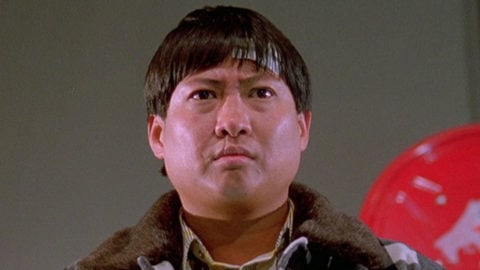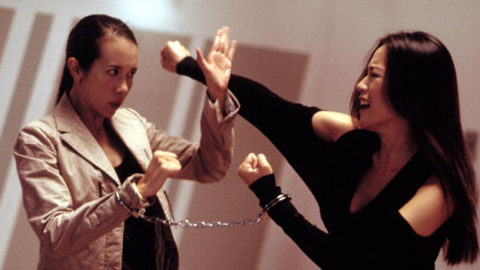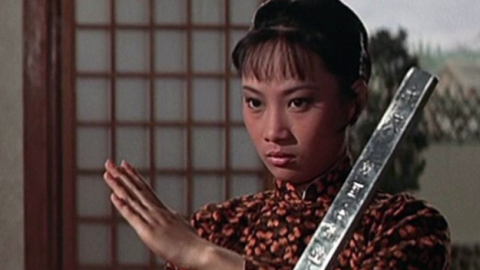Warrior Class: Female Asian Action Heroes
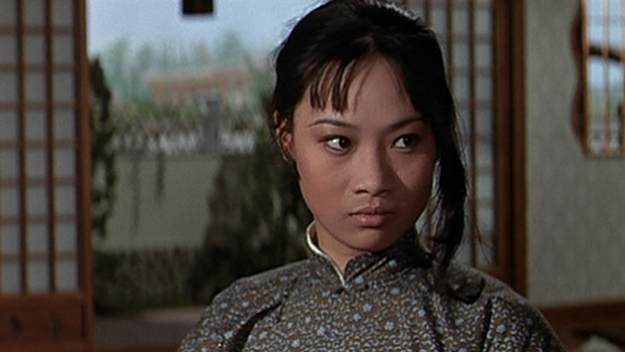
Hapkido
Though the situation has improved a bit in recent years, there was a time when Hollywood couldn’t create a strong female action hero to save its life. For every movie featuring an Ellen Ripley, Sarah Connor, Alice or Katniss Everdeen, Asian film industries managed to produce several dozen more entertaining, hard-hitting action flicks featuring strong female characters portrayed by butt-kicking heroines, many of them real-life martial arts champions or physically gifted dancers or performers. In a tradition going back almost to the birth of cinema, the Hong Kong film industry in particular has always had a major subgenre devoted to female action heroes, and now, thanks to various streaming services, there’s a good cross-section of films featuring sword-wielding or gun-toting, kick-ass women available for American fans’ viewing pleasure.
For many fans, the reigning queen of Asian action heroines remains Angela Mao Ying, born in Taiwan, star of nearly two dozen films made for Hong Kong’s Golden Harvest studio during the 1970s (and currently the owner of several restaurants in Queens). Best known in the U.S. for her cameo in a flashback as Bruce Lee’s murdered little sister in Enter the Dragon (1973), Mao was originally recruited from the Peking Opera world by Golden Harvest producer Raymond Chow to appear in the debut feature of director Huang Feng, The Angry River (1971), a serviceable wu xia period swordplay action film. For Mao’s follow-up, Huang took inspiration from Lee’s success and dropped the swords in favor of bare-fisted martial arts action. Now available to stream on Amazon Prime, Hapkido (1972; better-known in the U.S. at the time as Lady Kung Fu) turned Mao into an iconic action heroine and the first female kung fu movie star. But it wasn’t kung fu per se being depicted on screen; instead, the film focused on the Korean-born martial art of Hapkido, which Mao had trained in herself, and even cast one of the founding teachers of the discipline, Master Ji Han-jae, as Mao’s sifu.
An instant classic, Hapkido begins by introducing three Chinese Hapkido students in mid-’30s Japanese-occupied Korea, played by Mao; Sammo Hung, an action director and superstar in his own right; and Carter Wong, later one of the mystical Storms in John Carpenter’s Big Trouble in Little China [1986]). The trio are sent back to China by their teacher (Master Ji) to spread the martial arts gospel, but once there, they come into conflict with the Japanese Black Bear School of Karate, and hot-headed Sammo gets the group into trouble after beating up several Black Bear students in a restaurant. Although the plot, which echoes that of Lee’s Fist of Fury (1972; aka The Chinese Connection), is a fairly standard “the Japanese are bad” martial arts film, Mao’s visceral presence and the high standard of quality of the overall production (from the period setting to the plentiful, spectacular action sequences) elevate it to the highest levels of the genre. (Note that Hapkido streams on Amazon Prime in an English-dubbed version, though advertised on the site as being subtitled.)
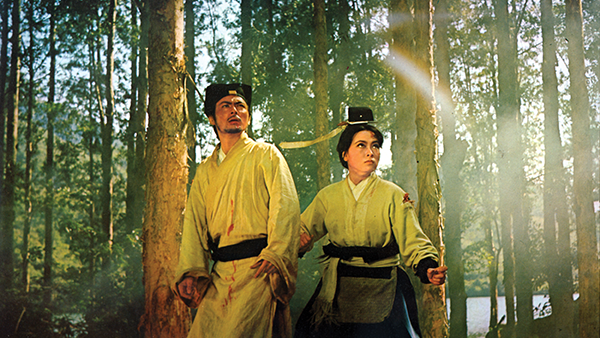
A Touch of Zen
Sammo Hung directed the action in Hapkido and The Angry River and went on to collaborate with Mao on several more of her best films, including Lady Whirlwind (1972) and When Taekwondo Strikes (1973), but earlier he had lent his talents to a film which established another iconic action heroine, and one of the top two screen swordswomen in Chinese-language cinema. King Hu’s A Touch of Zen (1971) is available to stream in its original Mandarin language (with English subtitles) on the FilmStruck Criterion Channel, and was recently given a long-overdue restoration via the efforts of the Taiwan Film Institute. Hu’s masterpiece and a martial arts classic, Touch of Zen stars Hsu Feng as a steely-eyed and mysterious swordswoman who enters the film as a supporting character but soon grabs the viewer’s attention and never lets it go. Hsu had originally appeared in a small part in Hu’s earlier Dragon Inn (1967) but it was Zen which solidified her place in martial arts movie history, and she went on to star in several more of the director’s films throughout the ’70s. Unflappable, stoic, and every bit as tough as her male counterpart, a general in disguise played by Pai Ying, Hsu’s character eventually has an affair with the cowardly scholar (Shih Chun) who is the center of the story, but it takes place entirely off screen, even though she later becomes pregnant with his child. Like Mao and many other female action heroes to come, Hsu’s characters were always presented as strong warriors first, feminine perhaps but not presented in a prurient or sexual manner, and never as eye candy. Although she retired from appearing onscreen in the ’80s, Hsu has remained active in the Chinese-language movie industry, serving as co-producer on films like Farewell, My Concubine (1993) and Temptress Moon (1996).
A Touch of Zen features one of the best villains of any 1970s swordplay film, a cunning enemy commander whose troops dog Hsu at ever turn, portrayed by Han Ying-chieh, who also served as action director. Han was one of Sammo Hung’s primary mentors: the two of them collaborated on action director duties for Mao’s The Angry River; Han had also directed the action for Bruce Lee’s debut film. But his long movie lineage stretches back to the Shaw Brothers studio in the 1960s, where he helped to forge the career of the other Queen of Swordplay Cinema, a ballet dancer turned actress named Cheng Pei-pei. Although she had appeared in several films earlier, Cheng’s first starring role in a martial arts film came, like Hsu Feng’s, courtesy of director King Hu during his short-lived stint with the studio. His final film for Shaw, Come Drink With Me (66) revolutionized the industry, and gave Hong Kong not only one of its first period swordplay films shot in a new, modern style (inspired by Japanese swordplay films of the time), but also its first female action lead.
Available to stream on Netflix in its original Mandarin with English subtitles, Come Drink with Me features Cheng as swordswoman Golden Swallow, who disguises herself as a man in order to rescue her brother from bandits. Teaming up with several other heroes, she eventually reveals herself to be a woman in a breathtaking fight scene shot outside a temple, Cheng shaking her long hair loose from her head after her topknot is cut by an adversary. Although Cheng wasn’t a martial artist by training, her grace as a dancer was evident on screen and Hu successfully edited around her deficiencies to create one of the most iconic screen heroines in the world of action cinema. She reprised her Golden Swallow character in an inferior semi-sequel directed by Chang Cheh, Golden Swallow (1967), which is available to stream on Amazon Prime in an English dubbed version. Although it co-stars One-Armed Swordsman star Jimmy Wang Yu, Cheng’s role is reduced nearly to window-dressing, not a surprise given Chang’s longtime obsession with cinematic masculinity and male-bonding. The Shadow Whip (1971), also available on Amazon Prime but in a Mandarin version with English closed-captions, is a better showcase for Cheng. Lo Wei, who directed Bruce Lee’s first two features, copies King Hu in a tale of intrigue set in the snow and featuring Cheng as a whip-wielding heroine. Her lasting influence on martial arts cinema was evident when Ang Lee cast her to appear as the villainous Jade Fox in his Hu-inspired Crouching Tiger, Hidden Dragon (2000).
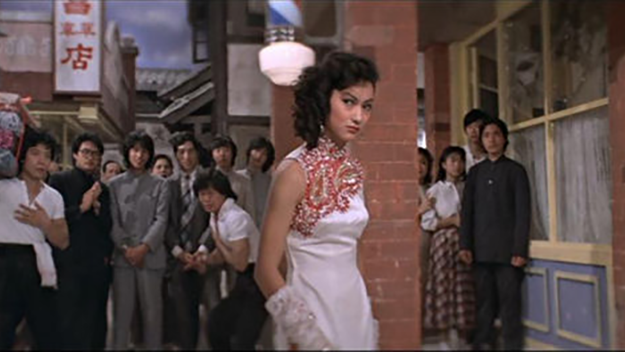
My Young Auntie
Shaw Brothers studio was not shy in casting strong female leads in their action films, but they were a bit late in bringing a female lead to the bare-fisted martial arts genre, as opposed to period swordplay or fantasy films. Although there were a few actresses who had tangled with male counterparts earlier, the studio found a superstar in Kara Hui, who had joined the studio in the late ’70s after being discovered by director and action choreographer Lau Kar-leung. She appeared in many of Lau’s films in supporting roles, but made an unforgettable impression in her first leading role, in Lau’s kung fu comedy My Young Auntie (1981), available to stream on Amazon Prime in Cantonese with English subtitles (the audio is erroneously labeled as English). Hui plays a martial arts expert from the countryside who comes to the city to assume responsibility for her late husband’s estate; she had married her master in order to keep his properties safe from an unscrupulous brother. Being the senior member of the family despite her age leads the film into comedy territory, as the rest of the family struggles to treat this young lady as their “auntie.” Plenty of fish-out-of-water comedy also transpires, but the film builds up to a blistering 40-minute martial arts climax as Hui is taken prisoner by the evil uncle (regular Shaw Brothers villain Wang Lung-wei) and her older nephew (played by Lau himself) and his siblings and students must come to her rescue. Hui is a wonder onscreen, capably handling both action and comedy with aplomb; she continued her successful career at Shaw Brothers and beyond and is best-known to international audiences most recently as the villain from Donnie Yen’s Dragon / Wu Xia (2011).
After leaving Shaw Brothers, Hui made a successful transition into more modern-day Hong Kong cinema, frequently appearing in contemporary action films and the occasional “Girls With Guns” subgenre film, such as Madam City Hunter (1993). In that film, Hui plays the stepmother of lead Cynthia Khan, one of the prime forces behind the subgenre, which had its heyday from 1985 to 1993. The “Girls With Guns” films featured strong female leads, usually supported by ineffective or soon-to-be-killed male counterparts, and blended martial arts action with heavy gunplay, usually supported by eye-piercing 80s fashion, heavy synth scores, and lots of explosions in empty warehouses and abandoned construction sites. Luckily for American viewers, one of the more mindboggling late entries in the genre is available to stream on Amazon Prime, in Cantonese with English subtitles. Angel Terminators (1990) put some of the top female action stars together in a depressing and violent story which befuddled its distributors so much that they shelved it for two years prior to release. Kara Hui and real-life martial artist and former Peking Opera student Sharon Yeung Pan-pan are a pair of cops hunting fugitive triad leader Kenneth Tsang, who’s come back to Hong Kong from Japan to shake up the underworld, bringing with him a tough and muscular female bodyguard (real-life powerlifting champion and “Girls With Guns” superstar Michiko Nishiwaki). Also in the mix is genre centerpiece Carrie Ng as Tsang’s ex-girlfriend, now the wife of a corrupt cop mixed up in the whole business. The convoluted story winds up with Hui and Yeung fighting Nishiwaki and a host of other bad guys (including regular Jackie Chan villain Dick Wei) as they make their way to Tsang, and one of the most jaw-droppingly violent and dark finales of the genre. A near-perfect mix of gunplay and martial arts, starring some of the top female action stars of the period, the movie is unmissable for fans of the genre.
Also available to stream on Amazon Prime, though only in an English-dubbed version, is The Avenging Quartet (1993), which stars Madam City Hunter‘s Cynthia Khan as a Mainland cop in Hong Kong, on the hunt for an art forger ex-boyfriend who possess a painting that holds a Japanese wartime secret. Helping her is a streetwise gal from Hong Kong played by one of the very top stars of the “Girls With Guns” genre, Moon Lee, who got her start in Tsui Hark’s action / fantasy Zu: Warriors from the Magic Mountain (1983) and went on to become a veritable cottage industry on her own. Lee and Khan turn out to have shared the same mysterious boyfriend, so much of the film is unfortunately devoted to unsuccessful romantic comedy misadventures. But once the Japanese elements of the plot arrive and start hunting for the macguffin painting, the movie heats up and speeds ahead to a fantastic climax. Nishiwaki returns as one of the villains, but the real treat here is Japanese martial artist Yukari Oshima, a veteran of Sonny Chiba’s Action Club, and one of the biggest foreign stars of ’80s and ’90s Hong Kong cinema. Oshima commands a team of ninja who stop at nothing to get the painting, and Hong Kong stunt actor and regular Jackie Chan collaborator Chin Kar-lok gets into the action as a policeman helping out Khan and Lee. Despite the comedy padding, the hard-hitting ending makes Avenging Quartet more than worth a watch.
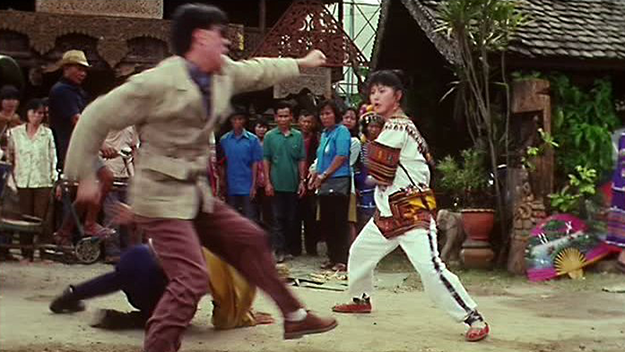
Mission of Justice
Although she usually played villains, Oshima gets a good heroine role in Mission of Justice (1992), available on Amazon Prime in an echoey Mandarin-language dub but with English subtitles. Oshima and Moon Lee are Hong Kong PTU (special tactics) police officers who are sent by commander Carrie Ng to Thailand to arrest and bring back a notorious Chinese drug lord who is being protected by a flamboyant Thai killer improbably named Hans. Although the film makes a major detour in its middle to focus on the villains on the run, the climactic martial arts and machine gun battle is well-staged, successfully capturing Lee’s grace and Oshima’s power, two martial artists as the peak of their careers but vastly different in terms of style and image.
One of Moon Lee’s defining works was the Angel series, also known as Iron Angels. She starred in three entries, with Oshima paired with her in the first film, and although the quality declined as the series went on, the second installment is good fun, and available to watch on Amazon Prime in a Cantonese language version with English subtitles. Angel 2 (1988) sends Lee and partners Alex Fong and female action star Elaine Lui (both also returning from part one) to Malaysia on vacation. Being Interpol-type agents, they don’t get to relax for long, particularly since Fong’s old friend Peter turns out to be an arms dealer who watches Hitler documentaries on TV and is plotting to overthrow the government in favor of some kind of Mainland China-style Communist dictatorship. The plot is incidental, though, as the team gets into multiple action sequences ending in a massive jungle battle choreographed by action director Stanley Tong, who would go on to direct Jackie Chan in Supercop, Rumble in the Bronx, First Strike, and several other films. The Angel series is also notable in having a rare female director, Teresa Woo, at its helm, though her career details remain elusive and the series’ style doesn’t distinguish itself considerably from that of other male directors.
It should be obvious by now that the Hong Kong film industry is one of frequent cross-pollination by its writers, directors, actors, action choreographers and others, and if the many names dropped in this article are confusing, one more title is available to stream which might clarify things. Top Fighter 2: Deadly Fighting Dolls (1996; aka Deadly China Dolls) is a U.K. documentary clip show directed by martial arts movie historian Toby Russell which lays out all the female action stars of the genre in easy-to-understand order. Available to stream on Amazon Prime, the clip and interview quality varies wildly, but it’s an informative treatment of the history and highlights of the genre, and covers everyone from Angela Mao to Cheng Pei-pei, Moon Lee, Kara Hui, Hsu Feng, Michelle Yeoh, and American-turned-HK star Cynthia Rothrock. It’s an essential accompaniment to make sense of the films cited above, and an entertaining documentary in its own right.
Playlist:
Hapkido
A Touch of Zen
Come Drink with Me
Golden Swallow
The Shadow Whip
My Young Auntie
Angel Terminators
Avenging Quartet
Mission of Justice
Angel 2
Top Fighter 2
Marc Walkow is a writer and film programmer living in New York. Formerly a director of the New York Asian Film Festival, he has also produced DVDs and Blu-rays for Criterion and Arrow Video.



